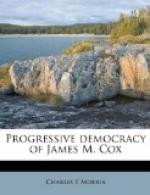Soldiers of no state were better supplied with all the comforts that could be provided than those of Ohio. While the Thirty-seventh was in camp in the far South a Christmas train was sent to it. Special funds were raised for entertainment of both the Ohio camps. In a word, every war activity felt the vigilant care and sympathetic help of the Governor.
During the war time there were few idle men in Ohio. Through proclamation attention of local authorities was directed to an old law making vagrancy an offense and it was applied rigorously.
No less in reconstruction than in was activities his energies were tireless. The Governor took the lead in securing legislation to correct the defects found in educational laws and one of the statutes placed upon the books at his suggestion provided for an oath of allegiance on the part of teachers. Referring to disclosures in certain cities, he said: “We have had our bitter experiences and love for our children compels us, in common prudence, to protect them.”
Without sympathy for the mischievous spirits who sought to foment trouble in America, the Governor clearly expressed his conception of Americanization as a voluntary spiritual, and not a compulsory, process. The policy he had in mind was indicated in an address in Chicago in March, 1920, in which he said:
“There must be no compromise with treason, but the surest death to Bolshevism is exposure of the germ of the disease itself to the sunlight of public view. We must protect ourselves against extremes in America. The horrors and tragedies of revolution can be charged to them. If government is assailed, its policy must not become vengeful. Our fathers in specifying what human freedom was, and providing guarantees for its preservation, recognized that among the necessary precautions was the protection of individual right against governmental abuses.




